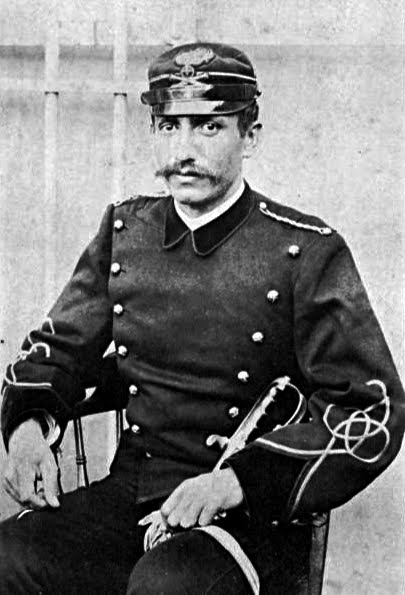The Honolulu Rifles regiment was a militia force of predominantly Anglo-American or European descendants living in Hawaii, formed in Honolulu in what was then the Kingdom of Hawaii, Honolulu Rifles regiment became a potent military presence in Hawaii at a critical time in the island nation’s history, which came to be called the Hawaii Rebellions from 1887-1895.
Flag of the Kingdom of Hawaii 1795-1893
Honolulu Rifles regiment
The downfall of both the Kingdom of Hawaii Hawaii ’s annexation as a territory of the United States was in its day a diplomatic and political hair trigger argument. President Grover Cleveland (b.1837-1908) opposed annexation in both his terms as president and only during President William McKinley's term in 1898 did the machinations & campaigning of the Hawaiian league pay off.
A group of influential annexationists who wanted Hawaii for either Britain or America , the Hawaiian league was led by Lorrin A. Thurston (b.1858-1931) son of the first American missionaries to come to Hawaii in the mid 1850’s.
The League essentially used the Honolulu Rifles as a tool in building what they wanted, a westernized puppet state republic. Almost all of the officers of the regiment were members of the Hawaiian league and its influence under the guise of the Committee of Safety was critical. Brigade captain and fervent annexationist Volney V. Ashford was the commander of the Honolulu Rifles brigade from 1886-1893. Ashford, who was Canadia had served in the Union Army during the Civil War, enlisting in 1863, serving throughout the war in the 21stNew York (Griswold’s’ Light) volunteer cavalry regiment, mustering out of the army as a second lieutenant.
Capt. of the Honululu Rifles, Volney V. Ashford (b.1844-1900)
The League essentially used the Honolulu Rifles as a tool in building what they wanted, a westernized puppet state republic. Almost all of the officers of the regiment were members of the Hawaiian league and its influence under the guise of the Committee of Safety was critical. Brigade captain and fervent annexationist Volney V. Ashford was the commander of the Honolulu Rifles brigade from 1886-1893. Ashford, who was Canadia had served in the Union Army during the Civil War, enlisting in 1863, serving throughout the war in the 21st
Officers of the regiment including Capt. Ashford's younger brother, sitting w/ sabre
Captain Ashford by most accounts was a smart (originally a lawyer), charismatic, and absolutely beloved officer by his men. More importantly he knew tactics, strategy, & how to lead a regiment like a professional officer.
The Honolulu Rifles were active in all of the rebellions and intrigues from 1887-1895 including the minor rebellions led by Robert William Wilcox (b.1855-1903), a Hawaiian born officer who had studied at a military academy in Italy . He was a highly charismatic, influential, & a persistent anti-annexationist.
Wilcox in his fine tailored Italian officers uniform that he wore during his many revolts
Wilcox's first insurrection in 1889 saw a Garibaldi-inspired ‘Redshirt’ revolt against the Hawaiian King Kalākaua, for his appeasement of Westerners during the events which came to be called the Bayonet Constitution of 1887.After the Redshirts occupied ʻIolani Palace,
The second Wilcox insurrection in January 1895, known as the Counter Revolution, attempted to re-install the Hawaiian royal family and became the last major conflict of this period. Though the Hawaii Rebellions were relatively bloodless affairs there were several casualties and injuries during the many scattered rebellions, attempted rebellions, and counter rebellions of the period. Militia and volunteer forces were common during the rebellions but none had the flair, backing, and training of the Honolulu Rifles.
Honolulu Rifles in Full Dress 1887
Conflicts of the Hawaii
Wilcox Rebellion 1889-Wilcox raises a Redshirt militia group and occupies ‘Iolani Palace , the Honolulu rifles are sent and open fire with rifles and cannon, killing and wounding over 20 rebels before the rest surrendered.
Hawaiian Revolution 1893- January 17th illegal overthrow of the Kingdom of Hawaii
Leper War 1893- Brief rebellion of a leper colony in Kalalau Valley
2nd 'Wilcox Rebellion' (counter-revolution) 1895-Attempt to restore the Hawaiian monarchy fails, Wilcox is arrested and again charged for treason but eventually pardoned, serving as Hawaii's congressman from 1900 until his death in 1903.
Related Posts





